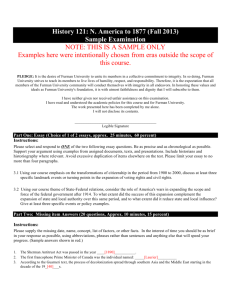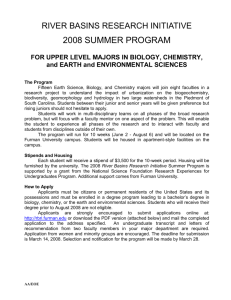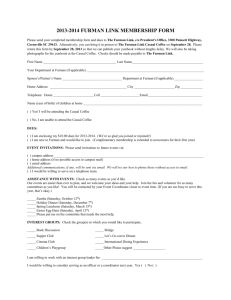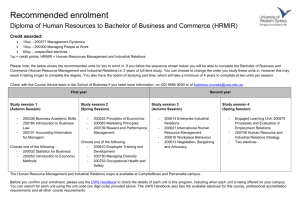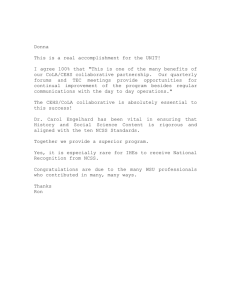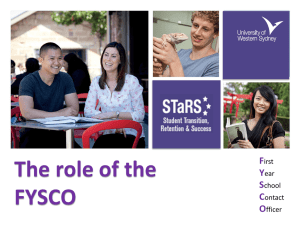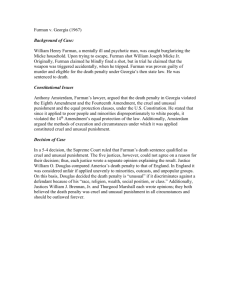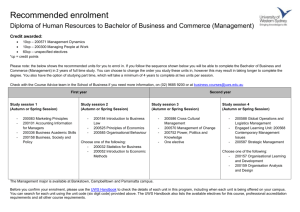Course Schedule by Individual Dates:
advertisement
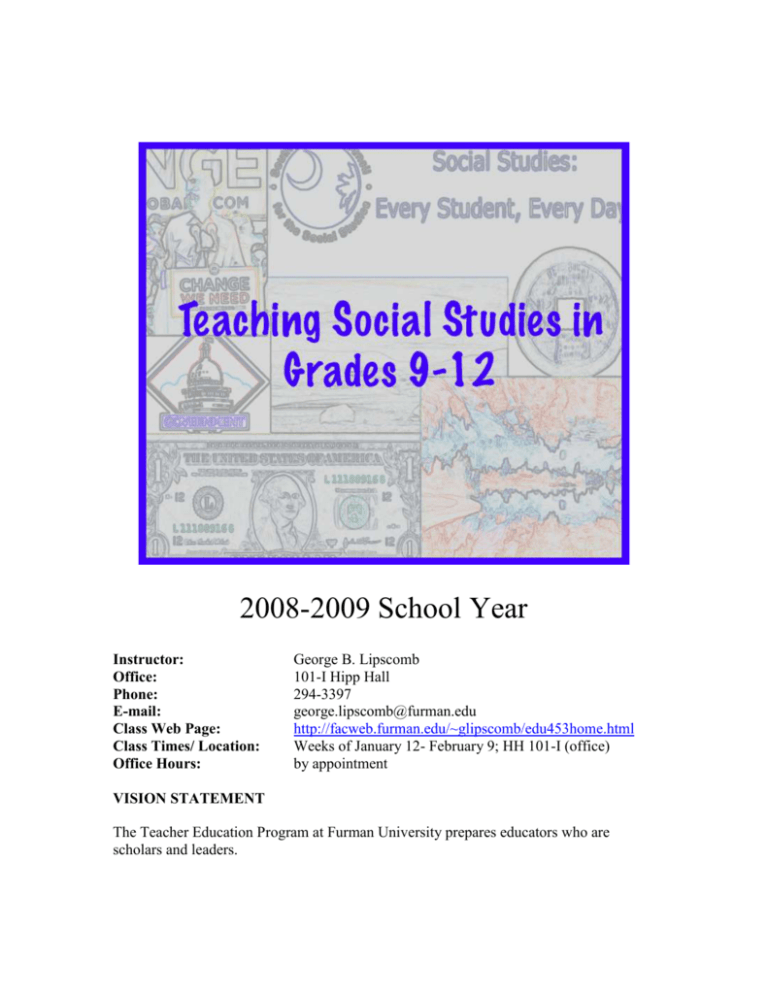
2008-2009 School Year Instructor: Office: Phone: E-mail: Class Web Page: Class Times/ Location: Office Hours: George B. Lipscomb 101-I Hipp Hall 294-3397 george.lipscomb@furman.edu http://facweb.furman.edu/~glipscomb/edu453home.html Weeks of January 12- February 9; HH 101-I (office) by appointment VISION STATEMENT The Teacher Education Program at Furman University prepares educators who are scholars and leaders. MISSION OF THE PROGRAM Furman University prepares teachers and administrators to be scholars and leaders who use effective pedagogy, reflect critically on the practice of teaching, promote human dignity, and exemplify ethical and democratic principles in their practice. Furman is committed to a program of teacher education that calls for collaborative, interdependent efforts throughout the academic learning community. The teacher education program is anchored in the university’s commitment to the liberal arts—encompassing the humanities, fine arts, mathematics, and social and natural sciences as the essential foundation for developing intellectually competent educators. Furthermore, candidates develop professional content knowledge, pedagogical skills, and dispositions through: • Mastery of subject matter • Understanding of philosophical, historical, and sociological foundations of education • Understanding of human development and its implications for learning • Understanding of social/cultural relationships • Understanding the interrelationship of curriculum, instruction, and assessment • Practice of critical inquiry and reflection on teaching and learning • Opportunities for leadership development • Opportunities to study and practice effective communication • Collaboration with peers and others REQUIRED TEXT/ SOFTWARE NCSS. (1994). Expectations of excellence: Curriculum standards for the social studies. Washington, D.C.: NCSS. LiveText- available for purchase at the bookstore ADDITIONAL READINGS (Will be added as the course progresses) COURSE DESCRIPTION (CATALOGUE) Provides in-depth investigation of the methods associated with teaching social studies on the secondary level. Special emphasis placed on how the social sciences differ from other disciplines, and how differences affect curricular and pedagogical strategies. (EXPANDED) EDU 453 will introduce teacher candidates to the social studies curriculum for grades 912. Through readings, discussions, hands-on activities, and primarily through field-based experiences, you will be challenged to view social studies in a new light. Throughout this course you will learn how to inquire so that you can make learning the pedagogical content knowledge (PCK) of secondary social studies an ongoing part of your professional life. This course is designed to move you beyond thinking like a student to help you begin thinking like a secondary social studies teacher. 2 MATRIX OF OBJECTIVES/TOPICS/ CONCEPTUAL FRAMEWORK/ CLASS OUTCOMES Course Objectives/ NCSS/ NCATE APSs/ (ADEPT) Social Studies teachers should possess the knowledge, capabilities, and dispositions to organize and provide instruction at the appropriate school level for the study of: 1. Teacher candidates Individual will probe how who Development and they are and what Identity. (1.4) they believe impact how they teach social studies. (APS10) 2. Teacher candidates (all connected, but of will explore the particular interest:) various content areas -Time, Continuity, and within the social Change (1.2) studies and recognize -People, Places, and the areas that Environments (1.3) influence a teacher's -Power, Authority, and content knowledge. Governance (1.6) -Production, (APS6) Distribution and Consumption -Science, Technology, and Society (1.8) 3. Teacher candidates Culture and Cultural will seek to Diversity (1.1) understand the existing sociocultural influences on teaching and examine how this context influences the social studies curriculum. (APS5 , APS8) 3 Related to conceptual framework for Furman’s Education Program Educators will: Class Outcomes related to each category Convey passion for teaching, learning, and self-renewal Reflections Demonstrate command of the subject matter(s) of preparation STS Page, Unit Work Sample Relate disciplinary knowledge across the curriculum Understand how diverse cultural, ethnic, socioeconomic, gender, and exceptionality issues affect student learning. UWS, class discussion 4. Teacher candidates Individual will identify existing Development and student Identity. (1.4) understandings and adapt social studies instruction for students of differing developmental levels, or learning styles accordingly. (APS5, APS7) 5. Teacher candidates Civic Ideals and will design and Practices (1.10) implement effective and appropriate classroom management strategies . (APS 9) 6. Teacher candidates All 10 standards could will demonstrate the be utilized. ability to plan a series of lessons consistent with and understanding of how students learn both inside and outside the classroom. (APS 2, APS 3, APS 5, APS7) 4 Monitor student learning and adjust practice based on knowledge of student interests, abilities, skills, experiences and peer relationships. Demonstrate basic proficiency in the use of current technologies appropriate for education Create, nurture, and maintain a sense of democratic community in the classroom, using effective and appropriate classroom management strategies to promote student responsibility for behavior. Demonstrate effective longand short-range planning strategies Understand the interrelationship of curriculum, instruction, and assessment UWS, STS page UWS UWS/ taught lessons COURSE SCHEDULE BY DATE (SUBJECT TO CHANGE) Week 1: Jan. 12 (9:30-11:30) Reading: NCSS (3-10) Class Activities: Go over syllabus; Gardner Activity; What is Social Studies? Jan. 13 (8:30- 11:00) Reading: NCSS (11-30, supplement) Class Activities: Strands activity, PASS Jan. 14- individual work (social studies reading) Reading: Handbook of Research in Social Studies Education (Ch. 1 and others) Jan. 15- at Mauldin (back to Furman for Critical Issues) Jan. 16- Dr. Lipscomb in NYC Week 2: Jan. 19- no class (MLK Hoilday) Jan. 20 (8:30-11:00) Reading: Levstik and Barton (History for the Common Good); Digital Geography Class Activities: Content- History/ Geography Jan. 21- individual work- examine SC Social Studies Standards/ Support Documents Jan. 22 at Mauldin (back to Furman for Critical Issues) Jan. 23 (8:30-11:30) Reading: Parker- “Teaching Against Idiocy;” Social Education issue on Economics Class Activities: Content- Government/ Economics 5 Week 3: Jan. 26 (8:30-11:30) Reading: Martorella- Ch. 4 “Organizing and Planning…..” Class Activities: Planning; using resources for teaching social studies Jan. 27- at Furman- library meeting space (resumes and interviewing) Jan. 28- individual work- work on content outline of teaching unit Jan. 29 at Mauldin (back to Furman for Critical Issues) Jan. 30 (8:30-11:30) Reading: Selections from “Real World Investigations for Social Studies” Class Activities: Teaching Strategies; lesson analysis Week 4: Feb. 2 (8:30-11:30) Due: Content Outline for UWS Reading: Small Group Strategies sheet; Hendrix article Class Activities: Cooperative Learning/ Small Group Activities Feb. 3- observe other teachers at Mauldin/ elsewhere Feb. 4- independent work- work on outline of lessons for teaching unit Feb. 5 at Mauldin (back to Furman for Critical Issues) Feb. 6 Reading: Yell, Nickell articles Class Activities: Assessment/ Rubrics and Scoring Guides; authentic assessment Week 5: Feb. 9 Reading: Dodge “WebQuest on WebQuests;” Lipscomb- “Sounds Good to Me” 6 Class Activities: Technology, WebQuests, Web 2.0 technology, Digital Resources, Photographs Feb. 10 at Mauldin Feb. 11 Due: Unit Outline (lessons and activities) Class Activities: More technology, preparation for teaching Feb. 12- at Mauldin (back to Furman for Critical Issues) Feb. 13 Class Activities: Preparation for teaching April 6-9- On campus work on UWS; Dr. Lipscomb will be available for consultation April 27- wrap up time ??? (TBD) ASSIGNMENTS Science, Technology, and Society Web Page (25%) Reflections (15%) Unit Work Sample (50%) Participation and Dispositions (10%) EXPLANATION OF ASSIGNMENTS Science, Technology, and Society Web Page (25%) NCSS STANDARDS ADDRESSED: 1.8, 1.2, others TASK Students in EDU 453 will select a topic from the list below (or one of their own choosing) and create a web-based portal that explores its impact on human society and/or on the physical world. This portal is intended to provide information on a topic that would be suitable for both teachers and students. POSSIBLE TOPICS Cellular phone Performance enhancing drugs (steroids) Hybrid cars iPod (portable audio players) 7 Recycling DNA testing Global warming Stem Cell Research Other topics may be selected with the permission of the instructor. REQUIREMENTS: Within this web portal, students should address the following areas: 1. General Description (NCSS 1.8.a) - Provide a complete description of your topic including: Historical background Current controversies 2. Judgment on Transformations (NCSS 1.8.b, NCSS 1.2) –Show the transformations that have occurred over time providing: A timeline of major events (8-10) Allow for judgments on these transformations 3. Societal Impacts (NCSS 1.8.c) – Analyze the way that society (local, national, international) has been impacted including: Changes in Values, Beliefs, and Attitudes Who changes who more? 4. Policy Evaluation (NCSS 1.8.d) – Include at least three relevant policy changes (proposed or actual) brought about by your topic 5. Identification of Multiple Perspectives-(NCSS 1.8.e) – Provide a chart showing multiple (at least 2) perspectives about human society 6. Strategies for Public Discussion- (NCSS 1.8.e) – Include possible (at least 3) proposals for influencing public discussion 7. Operation and Design (NETS-T 1,2) – This web portal should demonstrate the following design properties and principles: appropriate design elements (font size, color, etc.) Visuals present and appropriate Links operational Navigation clear Please e-mail me the URL of your page as an attachment by 5:00 on April 9. 8 Reflections (15%) Throughout Early Experience and the Spring Practicum you will be writing reflections on your classroom/ teaching experiences. These should be done in a timely manner and should go beyond simply summarizing your weekly actions. Specific topics/ issues to address will be given for most entries. Unit Work Sample (50%) DUE April 29 Candidates are required to create, implement, and submit a Unit Work Sample (UWS) during the spring semester of their senior block as part of their coursework and certification process. The minimum requirements of the UWS are outlined in the UWS template. Candidates may augment the minimum requirements, such as including a literature review supporting instructional practices, and may redesign the format of the final portfolio as long as the essential elements in the UWS template remain intact. Guidelines: A unit should be a coherent set of lessons connected by some content or instructional thread. For the UWS, create a unit that covers between one and two weeks of instruction. (ex. Progressivism, The Great Depression, etc.) The instructional goals (unit) and objectives (lessons) may be stated in a format of your choosing or as required by your school/district (sentences or questions, for example); these goals and objectives must be correlated with appropriate state and NCSS standards. The UWS should focus on one set of students (one period); the contextual factors (UWS Section II) submitted should focus on that selected sample of students. The assessments designed for the UWS should support your instruction as well as assist you in gathering data conducive to analyzing and displaying your instructional impact on student achievement. These assessments should show a variety of formats (selected-response and constructed-response) and should be structured throughout the unit to gather both formative and summative data. Assessments must be accompanied by all support materials you create to guide students (syllabus, assignment descriptions, etc.) and support the evaluation of the assessment (rubrics, scoring guides, etc.) Many more details to come during the term. 9 Preliminary Dates: Content Outline- Due Feb. 2 Unit Outline- Due Feb. 11 Teach Unit- Between Feb. 16 and April 3 Final Unit Due on LiveText- April 27 Participation and Dispositions (10%) With only one student, participation is a crucial component of EDU 453. Active participation includes: 1. Reading and preparing for class 2. Doing all is required of you at your schools (teaching, grading, tutoring, miscellaneous duties, etc.) In accordance with the conceptual framework of the Furman Education Department, we are aspiring for “Educators who are scholars and leaders are caring and thoughtful individuals who respond to the needs and experiences of students and others with whom they interact.” In this course, I expect you to conduct yourself in a professional manner and respect those in the schools in which you are doing your practicum. You will be expected to be present to manage your class every day. In the event that you cannot attend your school, in addition to letting your co-teacher know, make sure you alert me to the situation. I will make every effort to visit you at least once a week after February 16, but it is up to you to coordinate times with me well ahead of school visits. I would like to try to attend different classes if possible. Communication (preferably by e-mail) is essential, so let me know your schedule ASAP. Feedback from your co-teacher is critical and since they will be observing you on a daily basis, I will take their assessment into account very seriously as the spring term progresses. CONCERNING YOUR WORK Assignments (UWS and STS page) are due on the date shown on the syllabus. (or web page in case of changes) Late work will be penalized. (generally 10 points for each day it is late) 10 GRADING SCALE A 93-100 A- 91-92 B+ 88-90 B 83-87 B- 81-82 C+ 78-80 C 73-77 C- 71-72 D+ 68-70 D 63-67 D- 61-62 F 60 or below ACADEMIC INTEGRITY Integrity gives the educational enterprise its legitimacy. Honesty, respect, and personal responsibility are principles that guide academic life at Furman, in and out of the classroom. Academic misconduct in any form (plagiarism, cheating, inappropriate collaboration, and other efforts to gain an unfair academic advantage) threatens the values of the campus community and will have severe consequences, such as failure in the course, and/or suspension or dismissal from the university. If you have any question about what constitutes plagiarism or any other form of academic misconduct, it is your responsibility to consult with me so that you will fully understand what I expect of you in this course. If you have any doubts, ask! You should also be familiar with the Academic Integrity & Plagiarism and Academic Integrity at Furman materials available at http://www.furman.edu/integrity. A copy of Furman’s policy on academic dishonesty can also be found at this site. Furman University, the Education Department, and your professor are strongly committed to students performing as scholars while in all their courses. Such a commitment means that we expect the highest standards in written and oral performances—including a student’s understanding and application of academic honesty and scholarly documentation of all work. In this course, students will be expected to follow APA guidelines. The professor will provide help for writing, presenting, and documenting. Additional assistance may be found at http://owl.english.purdue.edu/handouts/research/r_apa.html DISABILITY STATEMENT Students with disabilities who need accommodations should contact the Office of Disability Services, at 294-2322. Please let me know early in the term if you do so. All discussions will remain confidential. 11 OTHER CLASSROOM CONCERNS I have tried to anticipate as many classroom eventualities as possible, but if I need to make changes in the syllabus or grading policies, I will make it clear in class and post these changes to the class web page 12
![Complete our nomination form. [Word Document]](http://s3.studylib.net/store/data/007019809_1-d1dd80e67ba6d9f65d5f39e3a17697c7-300x300.png)
